- Home
- Virginia Woolf
Night and Day Page 22
Night and Day Read online
Page 22
CHAPTER XXII
The fact that she would be late in keeping her engagement with Williamwas not the only reason which sent Katharine almost at racing speedalong the Strand in the direction of his rooms. Punctuality might havebeen achieved by taking a cab, had she not wished the open air tofan into flame the glow kindled by Mary's words. For among all theimpressions of the evening's talk one was of the nature of a revelationand subdued the rest to insignificance. Thus one looked; thus one spoke;such was love.
"She sat up straight and looked at me, and then she said, 'I'm inlove,'" Katharine mused, trying to set the whole scene in motion. Itwas a scene to dwell on with so much wonder that not a grain of pityoccurred to her; it was a flame blazing suddenly in the dark; byits light Katharine perceived far too vividly for her comfort themediocrity, indeed the entirely fictitious character of her own feelingsso far as they pretended to correspond with Mary's feelings. She made upher mind to act instantly upon the knowledge thus gained, and casther mind in amazement back to the scene upon the heath, when she hadyielded, heaven knows why, for reasons which seemed now imperceptible.So in broad daylight one might revisit the place where one has gropedand turned and succumbed to utter bewilderment in a fog.
"It's all so simple," she said to herself. "There can't be any doubt.I've only got to speak now. I've only got to speak," she went on saying,in time to her own footsteps, and completely forgot Mary Datchet.
William Rodney, having come back earlier from the office than heexpected, sat down to pick out the melodies in "The Magic Flute" uponthe piano. Katharine was late, but that was nothing new, and, as she hadno particular liking for music, and he felt in the mood for it, perhapsit was as well. This defect in Katharine was the more strange, Williamreflected, because, as a rule, the women of her family were unusuallymusical. Her cousin, Cassandra Otway, for example, had a very fine tastein music, and he had charming recollections of her in a light fantasticattitude, playing the flute in the morning-room at Stogdon House. Herecalled with pleasure the amusing way in which her nose, long like allthe Otway noses, seemed to extend itself into the flute, as if she weresome inimitably graceful species of musical mole. The little picturesuggested very happily her melodious and whimsical temperament. Theenthusiasms of a young girl of distinguished upbringing appealed toWilliam, and suggested a thousand ways in which, with his training andaccomplishments, he could be of service to her. She ought to be giventhe chance of hearing good music, as it is played by those who haveinherited the great tradition. Moreover, from one or two remarks letfall in the course of conversation, he thought it possible that shehad what Katharine professed to lack, a passionate, if untaught,appreciation of literature. He had lent her his play. Meanwhile, asKatharine was certain to be late, and "The Magic Flute" is nothingwithout a voice, he felt inclined to spend the time of waiting inwriting a letter to Cassandra, exhorting her to read Pope in preferenceto Dostoevsky, until her feeling for form was more highly developed. Heset himself down to compose this piece of advice in a shape which waslight and playful, and yet did no injury to a cause which he had nearat heart, when he heard Katharine upon the stairs. A moment later it wasplain that he had been mistaken, it was not Katharine; but he could notsettle himself to his letter. His temper had changed from one of urbanecontentment--indeed of delicious expansion--to one of uneasiness andexpectation. The dinner was brought in, and had to be set by the fire tokeep hot. It was now a quarter of an hour beyond the specified time. Hebethought him of a piece of news which had depressed him in the earlierpart of the day. Owing to the illness of one of his fellow-clerks, itwas likely that he would get no holiday until later in the year, whichwould mean the postponement of their marriage. But this possibility,after all, was not so disagreeable as the probability which forceditself upon him with every tick of the clock that Katharine hadcompletely forgotten her engagement. Such things had happened lessfrequently since Christmas, but what if they were going to begin tohappen again? What if their marriage should turn out, as she had said, afarce? He acquitted her of any wish to hurt him wantonly, but therewas something in her character which made it impossible for her to helphurting people. Was she cold? Was she self-absorbed? He tried to fit herwith each of these descriptions, but he had to own that she puzzled him.
"There are so many things that she doesn't understand," he reflected,glancing at the letter to Cassandra which he had begun and laid aside.What prevented him from finishing the letter which he had so muchenjoyed beginning? The reason was that Katharine might, at any moment,enter the room. The thought, implying his bondage to her, irritated himacutely. It occurred to him that he would leave the letter lying openfor her to see, and he would take the opportunity of telling her that hehad sent his play to Cassandra for her to criticize. Possibly, but notby any means certainly, this would annoy her--and as he reached thedoubtful comfort of this conclusion, there was a knock on the door andKatharine came in. They kissed each other coldly and she made no apologyfor being late. Nevertheless, her mere presence moved him strangely;but he was determined that this should not weaken his resolution to makesome kind of stand against her; to get at the truth about her. He lether make her own disposition of clothes and busied himself with theplates.
"I've got a piece of news for you, Katharine," he said directly they satdown to table; "I shan't get my holiday in April. We shall have to putoff our marriage."
He rapped the words out with a certain degree of briskness. Katharinestarted a little, as if the announcement disturbed her thoughts.
"That won't make any difference, will it? I mean the lease isn'tsigned," she replied. "But why? What has happened?"
He told her, in an off-hand way, how one of his fellow-clerks had brokendown, and might have to be away for months, six months even, in whichcase they would have to think over their position. He said it in a waywhich struck her, at last, as oddly casual. She looked at him. There wasno outward sign that he was annoyed with her. Was she well dressed? Shethought sufficiently so. Perhaps she was late? She looked for a clock.
"It's a good thing we didn't take the house then," she repeatedthoughtfully.
"It'll mean, too, I'm afraid, that I shan't be as free for aconsiderable time as I have been," he continued. She had time toreflect that she gained something by all this, though it was too soon todetermine what. But the light which had been burning with such intensityas she came along was suddenly overclouded, as much by his manner as byhis news. She had been prepared to meet opposition, which is simple toencounter compared with--she did not know what it was that she hadto encounter. The meal passed in quiet, well-controlled talk aboutindifferent things. Music was not a subject about which she knewanything, but she liked him to tell her things; and could, she mused, ashe talked, fancy the evenings of married life spent thus, over the fire;spent thus, or with a book, perhaps, for then she would have time toread her books, and to grasp firmly with every muscle of her unused mindwhat she longed to know. The atmosphere was very free. Suddenly Williambroke off. She looked up apprehensively, brushing aside these thoughtswith annoyance.
"Where should I address a letter to Cassandra?" he asked her. It wasobvious again that William had some meaning or other to-night, or was insome mood. "We've struck up a friendship," he added.
"She's at home, I think," Katharine replied.
"They keep her too much at home," said William. "Why don't you ask herto stay with you, and let her hear a little good music? I'll just finishwhat I was saying, if you don't mind, because I'm particularly anxiousthat she should hear to-morrow."
Katharine sank back in her chair, and Rodney took the paper on hisknees, and went on with his sentence. "Style, you know, is what we tendto neglect--"; but he was far more conscious of Katharine's eye upon himthan of what he was saying about style. He knew that she was looking athim, but whether with irritation or indifference he could not guess.
In truth, she had fallen sufficiently into his trap to feeluncomfortably roused and disturbed and unable to proceed on the lineslaid down for h
erself. This indifferent, if not hostile, attitudeon William's part made it impossible to break off without animosity,largely and completely. Infinitely preferable was Mary's state, shethought, where there was a simple thing to do and one did it. In fact,she could not help supposing that some littleness of nature had a partin all the refinements, reserves, and subtleties of feeling for whichher friends and family were so distinguished. For example, although sheliked Cassandra well enough, her fantastic method of life struck her aspurely frivolous; now it was socialism, now it was silkworms, now itwas music--which last she supposed was the cause of William's suddeninterest in her. Never before had William wasted the minutes of herpresence in writing his letters. With a curious sense of light openingwhere all, hitherto, had been opaque, it dawned upon her that, afterall, possibly, yes, probably, nay, certainly, the devotion which she hadalmost wearily taken for granted existed in a much slighter degree thanshe had suspected, or existed no longer. She looked at him attentivelyas if this discovery of hers must show traces in his face. Never had sheseen so much to respect in his appearance, so much that attracted her byits sensitiveness and intelligence, although she saw these qualities asif they were those one responds to, dumbly, in the face of a stranger.The head bent over the paper, thoughtful as usual, had now a composurewhich seemed somehow to place it at a distance, like a face seen talkingto some one else behind glass.
He wrote on, without raising his eyes. She would have spoken, but couldnot bring herself to ask him for signs of affection which she had noright to claim. The conviction that he was thus strange to her filledher with despondency, and illustrated quite beyond doubt the infiniteloneliness of human beings. She had never felt the truth of this sostrongly before. She looked away into the fire; it seemed to her thateven physically they were now scarcely within speaking distance; andspiritually there was certainly no human being with whom she couldclaim comradeship; no dream that satisfied her as she was used to besatisfied; nothing remained in whose reality she could believe, savethose abstract ideas--figures, laws, stars, facts, which she couldhardly hold to for lack of knowledge and a kind of shame.
When Rodney owned to himself the folly of this prolonged silence, andthe meanness of such devices, and looked up ready to seek some excusefor a good laugh, or opening for a confession, he was disconcerted bywhat he saw. Katharine seemed equally oblivious of what was bad orof what was good in him. Her expression suggested concentration uponsomething entirely remote from her surroundings. The carelessness of herattitude seemed to him rather masculine than feminine. His impulse tobreak up the constraint was chilled, and once more the exasperatingsense of his own impotency returned to him. He could not helpcontrasting Katharine with his vision of the engaging, whimsicalCassandra; Katharine undemonstrative, inconsiderate, silent, and yet sonotable that he could never do without her good opinion.
She veered round upon him a moment later, as if, when her train ofthought was ended, she became aware of his presence.
"Have you finished your letter?" she asked. He thought he heard faintamusement in her tone, but not a trace of jealousy.
"No, I'm not going to write any more to-night," he said. "I'm not in themood for it for some reason. I can't say what I want to say."
"Cassandra won't know if it's well written or badly written," Katharineremarked.
"I'm not so sure about that. I should say she has a good deal ofliterary feeling."
"Perhaps," said Katharine indifferently. "You've been neglecting myeducation lately, by the way. I wish you'd read something. Let me choosea book." So speaking, she went across to his bookshelves and beganlooking in a desultory way among his books. Anything, she thought, wasbetter than bickering or the strange silence which drove home to her thedistance between them. As she pulled one book forward and then anothershe thought ironically of her own certainty not an hour ago; how it hadvanished in a moment, how she was merely marking time as best she could,not knowing in the least where they stood, what they felt, or whetherWilliam loved her or not. More and more the condition of Mary's mindseemed to her wonderful and enviable--if, indeed, it could be quiteas she figured it--if, indeed, simplicity existed for any one of thedaughters of women.
"Swift," she said, at last, taking out a volume at haphazard to settlethis question at least. "Let us have some Swift."
Rodney took the book, held it in front of him, inserted one fingerbetween the pages, but said nothing. His face wore a queer expression ofdeliberation, as if he were weighing one thing with another, and wouldnot say anything until his mind were made up.
Katharine, taking her chair beside him, noted his silence and looked athim with sudden apprehension. What she hoped or feared, she could nothave said; a most irrational and indefensible desire for some assuranceof his affection was, perhaps, uppermost in her mind. Peevishness,complaints, exacting cross-examination she was used to, but thisattitude of composed quiet, which seemed to come from the consciousnessof power within, puzzled her. She did not know what was going to happennext.
At last William spoke.
"I think it's a little odd, don't you?" he said, in a voice of detachedreflection. "Most people, I mean, would be seriously upset if theirmarriage was put off for six months or so. But we aren't; now how do youaccount for that?"
She looked at him and observed his judicial attitude as of one holdingfar aloof from emotion.
"I attribute it," he went on, without waiting for her to answer, "to thefact that neither of us is in the least romantic about the other. Thatmay be partly, no doubt, because we've known each other so long; butI'm inclined to think there's more in it than that. There's somethingtemperamental. I think you're a trifle cold, and I suspect I'm a trifleself-absorbed. If that were so it goes a long way to explaining ourodd lack of illusion about each other. I'm not saying that the mostsatisfactory marriages aren't founded upon this sort of understanding.But certainly it struck me as odd this morning, when Wilson told me,how little upset I felt. By the way, you're sure we haven't committedourselves to that house?"
"I've kept the letters, and I'll go through them to-morrow; but I'mcertain we're on the safe side."
"Thanks. As to the psychological problem," he continued, as if thequestion interested him in a detached way, "there's no doubt, I think,that either of us is capable of feeling what, for reasons of simplicity,I call romance for a third person--at least, I've little doubt in my owncase."
It was, perhaps, the first time in all her knowledge of him thatKatharine had known William enter thus deliberately and without sign ofemotion upon a statement of his own feelings. He was wont to discouragesuch intimate discussions by a little laugh or turn of the conversation,as much as to say that men, or men of the world, find such topicsa little silly, or in doubtful taste. His obvious wish to explainsomething puzzled her, interested her, and neutralized the wound to hervanity. For some reason, too, she felt more at ease with him than usual;or her ease was more the ease of equality--she could not stop to thinkof that at the moment though. His remarks interested her too much forthe light that they threw upon certain problems of her own.
"What is this romance?" she mused.
"Ah, that's the question. I've never come across a definition thatsatisfied me, though there are some very good ones"--he glanced in thedirection of his books.
"It's not altogether knowing the other person, perhaps--it's ignorance,"she hazarded.
"Some authorities say it's a question of distance--romance inliterature, that is--"
"Possibly, in the case of art. But in the case of people it may be--"she hesitated.
"Have you no personal experience of it?" he asked, letting his eyes restupon her swiftly for a moment.
"I believe it's influenced me enormously," she said, in the tone of oneabsorbed by the possibilities of some view just presented to them; "butin my life there's so little scope for it," she added. She reviewed herdaily task, the perpetual demands upon her for good sense, self-control,and accuracy in a house containing a romantic mother. Ah, but herromance wasn'
t THAT romance. It was a desire, an echo, a sound; shecould drape it in color, see it in form, hear it in music, but not inwords; no, never in words. She sighed, teased by desires so incoherent,so incommunicable.
"But isn't it curious," William resumed, "that you should neither feelit for me, nor I for you?"
Katharine agreed that it was curious--very; but even more curious toher was the fact that she was discussing the question with William. Itrevealed possibilities which opened a prospect of a new relationshipaltogether. Somehow it seemed to her that he was helping her tounderstand what she had never understood; and in her gratitude she wasconscious of a most sisterly desire to help him, too--sisterly, save forone pang, not quite to be subdued, that for him she was without romance.
"I think you might be very happy with some one you loved in that way,"she said.
"You assume that romance survives a closer knowledge of the person oneloves?"
He asked the question formally, to protect himself from the sort ofpersonality which he dreaded. The whole situation needed the mostcareful management lest it should degenerate into some degrading anddisturbing exhibition such as the scene, which he could never thinkof without shame, upon the heath among the dead leaves. And yet eachsentence brought him relief. He was coming to understand something orother about his own desires hitherto undefined by him, the source of hisdifficulty with Katharine. The wish to hurt her, which had urged him tobegin, had completely left him, and he felt that it was only Katharinenow who could help him to be sure. He must take his time. There were somany things that he could not say without the greatest difficulty--thatname, for example, Cassandra. Nor could he move his eyes from a certainspot, a fiery glen surrounded by high mountains, in the heart of thecoals. He waited in suspense for Katharine to continue. She had saidthat he might be very happy with some one he loved in that way.
"I don't see why it shouldn't last with you," she resumed. "I canimagine a certain sort of person--" she paused; she was aware that hewas listening with the greatest intentness, and that his formality wasmerely the cover for an extreme anxiety of some sort. There was someperson then--some woman--who could it be? Cassandra? Ah, possibly--
"A person," she added, speaking in the most matter-of-fact tone shecould command, "like Cassandra Otway, for instance. Cassandra is themost interesting of the Otways--with the exception of Henry. Even so,I like Cassandra better. She has more than mere cleverness. She is acharacter--a person by herself."
"Those dreadful insects!" burst from William, with a nervous laugh, anda little spasm went through him as Katharine noticed. It WAS Cassandrathen. Automatically and dully she replied, "You could insist that sheconfined herself to--to--something else.... But she cares for music;I believe she writes poetry; and there can be no doubt that she has apeculiar charm--"
She ceased, as if defining to herself this peculiar charm. After amoment's silence William jerked out:
"I thought her affectionate?"
"Extremely affectionate. She worships Henry. When you think what a housethat is--Uncle Francis always in one mood or another--"
"Dear, dear, dear," William muttered.
"And you have so much in common."
"My dear Katharine!" William exclaimed, flinging himself back in hischair, and uprooting his eyes from the spot in the fire. "I really don'tknow what we're talking about.... I assure you...."
He was covered with an extreme confusion.
He withdrew the finger that was still thrust between the pages ofGulliver, opened the book, and ran his eye down the list of chapters, asthough he were about to select the one most suitable for reading aloud.As Katharine watched him, she was seized with preliminary symptoms ofhis own panic. At the same time she was convinced that, should he findthe right page, take out his spectacles, clear his throat, and open hislips, a chance that would never come again in all their lives would belost to them both.
"We're talking about things that interest us both very much," she said."Shan't we go on talking, and leave Swift for another time? I don't feelin the mood for Swift, and it's a pity to read any one when that's thecase--particularly Swift."
The presence of wise literary speculation, as she calculated, restoredWilliam's confidence in his security, and he replaced the book inthe bookcase, keeping his back turned to her as he did so, and takingadvantage of this circumstance to summon his thoughts together.
But a second of introspection had the alarming result of showing himthat his mind, when looked at from within, was no longer familiarground. He felt, that is to say, what he had never consciously feltbefore; he was revealed to himself as other than he was wont to thinkhim; he was afloat upon a sea of unknown and tumultuous possibilities.He paced once up and down the room, and then flung himself impetuouslyinto the chair by Katharine's side. He had never felt anything likethis before; he put himself entirely into her hands; he cast off allresponsibility. He very nearly exclaimed aloud:
"You've stirred up all these odious and violent emotions, and now youmust do the best you can with them."
Her near presence, however, had a calming and reassuring effect upon hisagitation, and he was conscious only of an implicit trust that, somehow,he was safe with her, that she would see him through, find out what itwas that he wanted, and procure it for him.
"I wish to do whatever you tell me to do," he said. "I put myselfentirely in your hands, Katharine."
"You must try to tell me what you feel," she said.
"My dear, I feel a thousand things every second. I don't know, I'm sure,what I feel. That afternoon on the heath--it was then--then--" He brokeoff; he did not tell her what had happened then. "Your ghastly goodsense, as usual, has convinced me--for the moment--but what the truthis, Heaven only knows!" he exclaimed.
"Isn't it the truth that you are, or might be, in love with Cassandra?"she said gently.
William bowed his head. After a moment's silence he murmured:
"I believe you're right, Katharine."
She sighed, involuntarily. She had been hoping all this time, with anintensity that increased second by second against the current of herwords, that it would not in the end come to this. After a moment ofsurprising anguish, she summoned her courage to tell him how she wishedonly that she might help him, and had framed the first words ofher speech when a knock, terrific and startling to people in theiroverwrought condition, sounded upon the door.
"Katharine, I worship you," he urged, half in a whisper.
"Yes," she replied, withdrawing with a little shiver, "but you must openthe door."

 Three Guineas
Three Guineas Flush
Flush Mrs. Dalloway
Mrs. Dalloway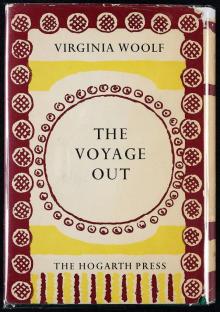 The Voyage Out
The Voyage Out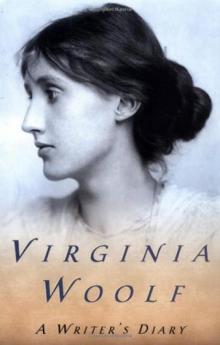 A Writer's Diary: Being Extracts From the Diary of Virginia Woolf
A Writer's Diary: Being Extracts From the Diary of Virginia Woolf To The Lighthouse
To The Lighthouse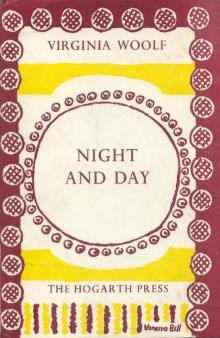 Night and Day
Night and Day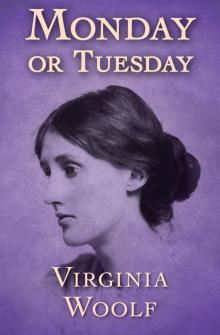 Monday or Tuesday
Monday or Tuesday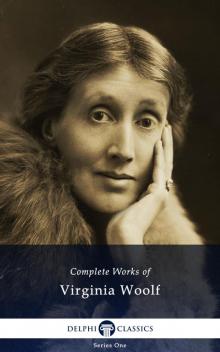 Complete Works of Virginia Woolf
Complete Works of Virginia Woolf Orlando
Orlando Genius and Ink
Genius and Ink Mrs. Dalloway (Annotated)
Mrs. Dalloway (Annotated)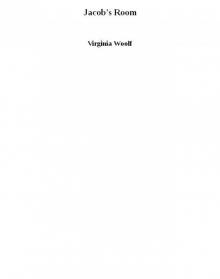 Jacob's Room
Jacob's Room THE RUSSIAN POINT OF VIEW
THE RUSSIAN POINT OF VIEW A Writer's Diary
A Writer's Diary Woolf Short Stories
Woolf Short Stories